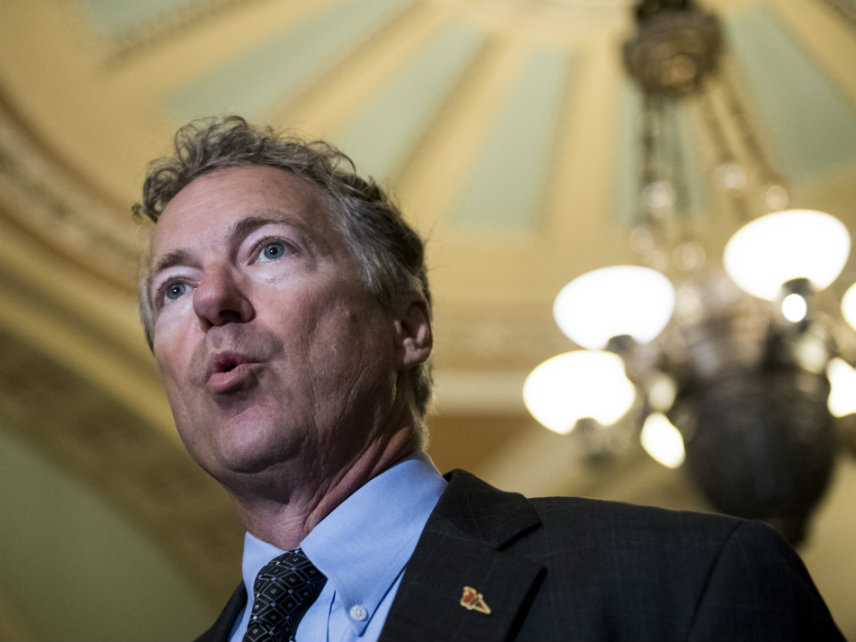Rand Paul and John McCain Might Have Killed the GOP's Obamacare Repeal Bill
Paul says he won't be swayed by Trump's threats. "I'm a big boy."

Sens. Rand Paul, R-Ky., and John McCain, R-Ariz., will vote against the latest Republican-led effort to repeal parts of Obamacare, likely killing any slim chance that the proposal had of reaching the necessary 50 votes in the Senate.
Paul told the Associated Press he plans to vote against the Graham-Cassidy bill because it does not do enough to repeal Obamacare's regulations and taxes.
McCain, in a statement issued later Friday, said he would not vote for the bill because he disagreed with the procedural shortcuts Republicans were taking to get the bill to the floor without committee hearings and the opportunity for amendments.
McCain, who cast the deciding vote against the Senate's so-called "skinny repeal" bill in July over similar concerns about Senate GOP leaders abandoning "regular order," said he would consider voting for the Graham-Cassidy bill "were it the product of extensive hearings, debate, and amendments" and only after getting a full CBO score of the bill, something that won't be available before the end of the month.
"I cannot in good conscience vote for the Graham-Cassidy proposal," McCain said Friday. "We should not be content to pass health care legislation on a party-line basis, as Democrats did when they rammed Obamacare through Congress in 2009. If we do so, our success could be as short-lived as theirs when the political winds shift, as they regularly do."
I cannot in good conscience vote for Graham-Cassidy. A bill impacting so many lives deserves a bipartisan approach. https://t.co/2sDjhw6Era pic.twitter.com/30OWezQpLg
— John McCain (@SenJohnMcCain) September 22, 2017
By themselves, Paul and McCain would not be enough to sink the GOP health care bill. But at least two other Republican senators—Lisa Murkowski of Alaska and Susan Collins of Maine—are widely believed to be "no" votes on the bill. Collins confirmed Friday to the Associated Press that she's leaning against the bill.
President Donald Trump on Friday threatened Republicans—and Paul in particular—who were considering voting against the bill. He said those who refused to support the Graham-Cassidy bill in the Senate "will forever…be known as 'the Republican who saved Obamacare'"
In the tweet, Trump specifically identified Paul, who has so far been the only Republican to go on the record as opposing Graham-Cassidy, though at least two other Republican senators—Lisa Murkowski of Alaska and Susan Collins of Maine—are widely believed to be "no" votes on the bill. Murkowski and Collins, along with Sen. John McCain, R-Ariz., voted against the so-called "skinny repeal" bill in July.
Rand Paul, or whoever votes against Hcare Bill, will forever (future political campaigns) be known as "the Republican who saved ObamaCare."
— Donald J. Trump (@realDonaldTrump) September 22, 2017
Trump's threats have nothing to do with the policy of the bill, and the White House is only interested in a political win, Paul told the AP.
Paul's assessment of the situation seems pretty accurate. Trump has never indicated much of an interest in the policy aspects of the health care debate that has raged on Capitol Hill since March, though he did quickly organize a Rose Garden press conference to celebrate the House's passage of an earlier Obamacare repeal bill. A lack of White House engagement was widely noted in the wake of the "skinny repeal" bill's embarrassing failure in July, but—aside from some bluster on Twitter—neither the president nor his top health officials have been particularly active in selling the Graham-Cassidy bill to potentially recalcitrant Republicans this week.
Indeed, even Republicans in the Senate who said they would vote for the Graham-Cassidy bill appeared this week to be having a difficult time explaining the merits of it. A vote on the bill is scheduled for next week, but that timeline is dictated more by the ticking clock than by any broad agreement that Graham-Cassidy is a good bill. Republicans only have until September 30 to pass a health care bill using the reconciliation process. After that a major rewrite of Obamacare will require 60 votes and therefore must have Democratic support.
Paul's and McCain's opposition creates some difficult math for GOP leaders. That's why Republicans, as IJR's Haley Byrd reported yesterday, have dangled a carrot in front of Murkowski. In exchange for voting to scrap parts of Obamacare, her home state of Alaska will be allowed to keep Obamacare. It's a blatantly political move to buy votes (the same kind of move that Republicans denounced when it was used to help pass Obamacare in the first place), and Paul is right to recognize it as such, which he did in his interview with the AP.
As for Trump's promise to attack him in future political campaigns if he votes against the bill?
"I'm a big boy," says Paul.


Show Comments (71)